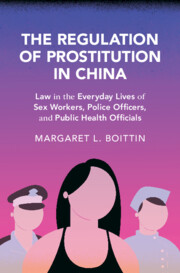 The Regulation of Prostitution in China
The Regulation of Prostitution in China Book contents
- The Regulation of Prostitution in China
- Cambridge Studies in Law and Society
- The Regulation of Prostitution in China
- Copyright page
- Dedication
- Contents
- Acknowledgments
- 1 Introduction
- Part I History, Contemporary Context, and Official Policies
- Part II Society
- 4 On the Streets and in the Brothels
- 5 In the Clubs
- 6 In the Home
- 7 Perspectives and Experiences Shared across Tiers of Prostitution
- Part III The State
- Book part
- Bibliography
- Index
- Cambridge Studies in Law and Society
5 - In the Clubs
from Part II - Society
Published online by Cambridge University Press: 05 December 2024
- The Regulation of Prostitution in China
- Cambridge Studies in Law and Society
- The Regulation of Prostitution in China
- Copyright page
- Dedication
- Contents
- Acknowledgments
- 1 Introduction
- Part I History, Contemporary Context, and Official Policies
- Part II Society
- 4 On the Streets and in the Brothels
- 5 In the Clubs
- 6 In the Home
- 7 Perspectives and Experiences Shared across Tiers of Prostitution
- Part III The State
- Book part
- Bibliography
- Index
- Cambridge Studies in Law and Society
Summary
This chapter is about middle-tier prostitution. The life of a hostess is exhausting. In addition to selling sex, women in this tier of the sex industry spend hours every evening engaging in their other professional responsibilities, which include drinking, dancing, and singing with clients. They face intense competition from their peers. Their work environment exposes them to health risks not only from HIV/AIDS and other sexually transmitted diseases, but also from the alcohol and tobacco they consume as part of their work. Although these conditions are taxing, they also provide middle-tier sex workers with more agency than their colleagues who work on the streets or in brothels, and lead to these women having more positive perspectives on prostitution than do their lower-tier colleagues. Hostesses tend to be assertive and reject any portrayal of their engagement in the sex industry as a story of victimhood. They also exhibit more trust in government institutions, an attitude that on rare occasions can even lead them to make public demands of the state. This work environment, autonomy and initiative contribute to public perceptions that tend to criticize hostesses as lazy and dishonorable.
- Type
- Chapter
- Information
- The Regulation of Prostitution in ChinaLaw in the Everyday Lives of Sex Workers, Police Officers, and Public Health Officials, pp. 125 - 140Publisher: Cambridge University PressPrint publication year: 2024
